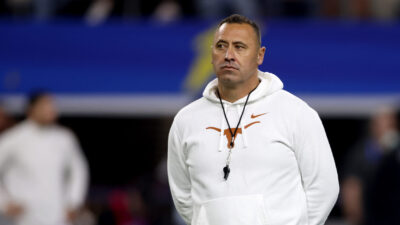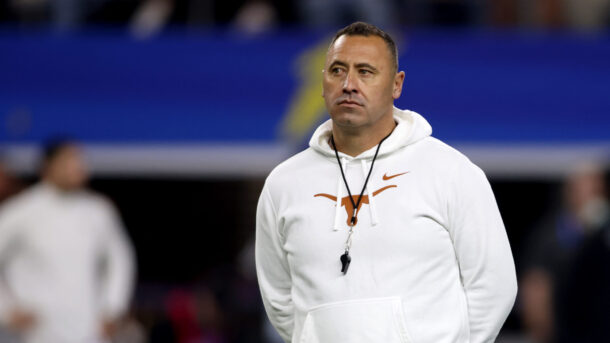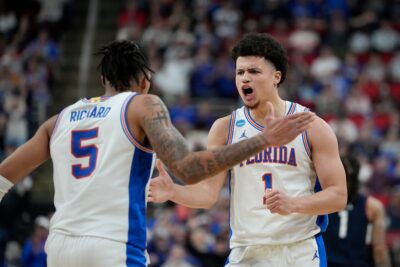Ad Disclosure
Travis Hunter’s narrow victory over Ashton Jeanty in the race for the 2024 Heisman Trophy became a topic of intense debate.
Among fans. The media. Even Jeanty, himself.
The Boise State running back rushed for 2,601 yards — just 27 yards short of the single-season Division I record set in 1988 by Heisman Trophy winner Barry Sanders. Jeanty also scored 30 touchdowns, 29 on the ground and 1 through the air, while leading his team into the College Football Playoff quarterfinals.
In any other year, Jeanty would likely have been the runaway winner of college football’s most prestigious award.
But he had the misfortune of coming along at the same time as the most successful 2-way player since the advent of 2-platoon football.
The uniqueness of Hunter’s skillset, the attention generated by his coach Deion Sanders and his stats – 96 catches for 1,258 yards and 15 touchdowns to go with 4 interceptions and 11 pass breakups – all helped to put the Colorado star over the top in a close race.
While a legitimate argument can be made that Jeanty was the more deserving candidate, his runner-up finish behind Hunter wasn’t even close to the biggest snub in Heisman history.
Top Heisman Trophy Snubs
Here are 10 instances in which the Heisman voting panel got it wrong. These players got the stiff arm from the voters and should have won the honor symbolic of the nation’s most outstanding college football player:
Chuck Muncie, Cal, 1975
Archie Griffin won in 1975 to become the first and to date only multiple winner of the award. But his numbers were significantly lower in ’75 than they were the previous season when he won his first Heisman. Griffin ran for 1,620 yards and 12 touchdowns in 1974, but only 1,357 yards and 4 scores in 1975. By contrast, Muncie rushed for 1,460 yards and 13 touchdowns while also catching 39 passes for 343 yards and 2 more scores. Although he finished second in the Heisman voting, he ended up more than 1,000 points behind the more popular Griffin.
Vince Young, Texas, 2005
Reggie Bush won the Heisman in 2005, “lost” it 5 years later because of NCAA infractions, then had it returned in 2024 because of changes in the “college athletics landscape.” All that drama could have been spared had the voting taken place after the Rose Bowl rather than before it. As great a season as Bush had – and it was great with 1,740 rushing yards, 478 receiving yards, 19 combined touchdowns and numerous Heisman highlights – Young’s was better. Not only did the Texas quarterback throw for 3,036 yards and 26 touchdowns while rushing for 1,050 yards and 12 touchdowns, he also outplayed Bush in the Rose Bowl by combining for 467 yards and 3 scores to beat Southern Cal and win the national championship.
Adrian Peterson, Oklahoma, 2004
No true freshman has won the Heisman. That precedent might have been the only thing that held Peterson back in 2004. Despite his lack of college experience, Peterson stepped right in and carried the Sooners to an undefeated regular season by rushing for 1,925 yards and 15 touchdowns. Peterson ended up second in the voting behind winner Matt Leinart, who threw for 3,322 yards and 33 touchdowns while leading Southern Cal to a national championship game win against Peterson and Oklahoma. Two redshirt freshmen, quarterbacks Johnny Manziel and Jameis Winston, eventually became Heisman winners in 2014 and 2015.
Larry Fitzgerald, Pittsburgh, 2003
Even with a resumé that includes 3,846 yards and 40 touchdowns in 2003, Oklahoma quarterback Jason White is in the conversation for the least-impressive Heisman winners of all-time. That’s especially true when compared to runnerup Fitzgerald. The Pitt sophomore won the receiving triple crown that season by leading the nation with 92 catches, 1,672 yards and 22 touchdowns. His 22 touchdowns were tied for the third-most in Division I history at the time and still ranks among the top 10 single-season marks ever.
OJ Simpson, Southern Cal, 1967
Simpson won the Heisman in 1968. But if the voters had gotten it right a year earlier, The Juice – not Archie Griffin – would have become the first player to win the award more than once. Simpson led the nation with 1,415 rushing yards while scoring 11 touchdowns on the ground and 2 more on kickoff returns in 1967. He provided an exclamation point to his season with a spectacular 67-yard touchdown run to help beat rival UCLA. And yet, when all the votes were tallied, Simpson was beaten out for the Heisman by Bruins quarterback Gary Beban, who completed only 87 passes for 1,359 yards and 8 touchdowns.
Marshall Faulk, San Diego State, 1992
Power conference bias predates the Playoff era. It was alive and well in the early 1990s when Faulk put together a season that probably would have earned him the Heisman had he not played for a San Diego State team that finished with a .500 record. Faulk led the nation with 1,530 yards on 300 rushing attempts to go with 24 touchdowns (21 on the ground and 3 through the air). While the eventual winner Gino Torretta of Miami had worthy numbers, they weren’t as good as the previous season when he led the nation with 3,095 passing yards. Torretta’s Heisman might have been viewed as a career achievement award. It also didn’t hurt that Miami was ranked No. 1 at the time the voting ended and the fact that his main competition played for a mid-major team with a .500 record.
Deshaun Watson, Clemson, 2016
The 2016 Heisman race that came down to a pair of ACC quarterbacks. Clemson’s Deshaun Watson won the head-to-head matchup with Louisville’s Lamar Jackson both on the scoreboard and the stat sheet. And he compiled better numbers over the final few weeks of a season that saw his Tigers win the ACC championship and Jackson’s Cardinals lose their final 2 games. But the Heisman probably was already decided by then. The competition was essentially over in mid-September once Jackson accounted for 5 touchdowns and more than 400 yards of total offense in back-to-back wins against Syracuse and No. 2 Florida State – performances he punctuated with what has become known as the Heisman Hurdle in which he leaped over an Orange defender on the way into the end zone.
Rex Grossman, Florida, 2001
Heisman winner Eric Crouch of Nebraska had a great season for a team that played in the national championship game. He ran for 1,115 yards and 18 touchdowns while throwing for 1,510 yards – although he had more interceptions (10) than touchdown passes (7). But Grossman’s 2001 season was exponentially better. He more than doubled Crouch’s passing yardage with 3,896 to go with 34 touchdowns and 12 picks. He also ran for 5 touchdowns for a team that played 6 ranked opponents, went 9-2 and destroyed sixth-ranked Maryland for win No. 10 in the Orange Bowl, with Grossman going 20-for-28 with 248 yards and 4 scores.
Jim Brown, Syracuse, 1956
Keep in mind that offensive football has evolved greatly since the 1950s. And that college teams played only 8 or so regular-season games per season in that era. But even with that disclaimer, the stats compiled by 1956 winner Paul Hornung of Notre Dame are head-scratching. He threw for only 917 yards with 3 touchdowns and 13 interceptions, and ran for just 420 and 3 scores. By contrast, Brown ran for 986 yards (averaging 123.3 per game) and 13 touchdowns. He also caught a touchdown pass and threw a touchdown pass. In retrospect, the reasons behind Brown’s snub can be traced to 2 factors: Hornung’s image as a golden boy playing for the most famous team in the land and Brown’s race. While it’s little consolation, Brown’s misfortune may have paved the way for another Syracuse back, Ernie Davis, to become the first Black Heisman winner 5 years later.
Peyton Manning, Tennessee, 1997
Manning was the odds-on favorite to win the Heisman heading into the 1997 season and his performance lived up to the hype. He threw for 2,819 yards and 36 touchdowns while leading Tennessee to an 11-win season. The problem is that he became such a dominant personality as the season progressed that many – including those with a Heisman vote – simply got tired of hearing about him. The growing sentiment that it was time for a defensive player to win the award also didn’t help. Michigan’s Charles Woodson had a great season. But even though he led the nation with 7 interceptions, to go with 3 touchdowns from scrimmage and 1 as a punt returner, his performance wasn’t close to that of fellow 2-way winner Travis Hunter. And nowhere near as dominant as Manning was on the offensive side of the ball.
Award-winning columnist Brett Friedlander has covered the ACC and college basketball since the 1980s.



